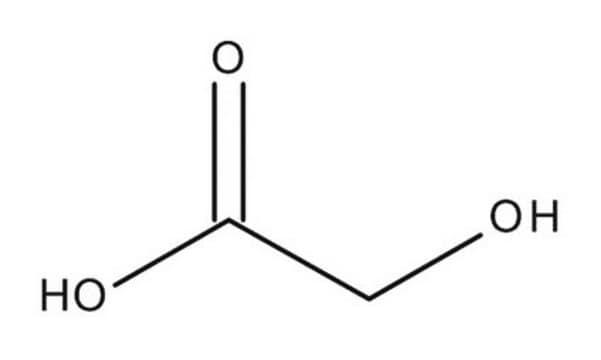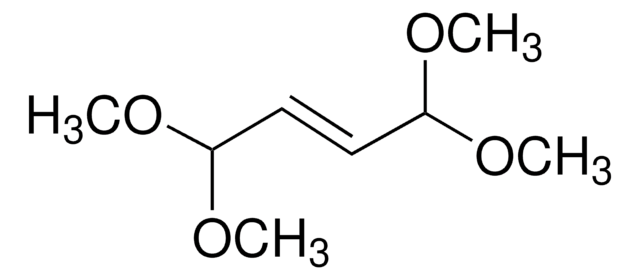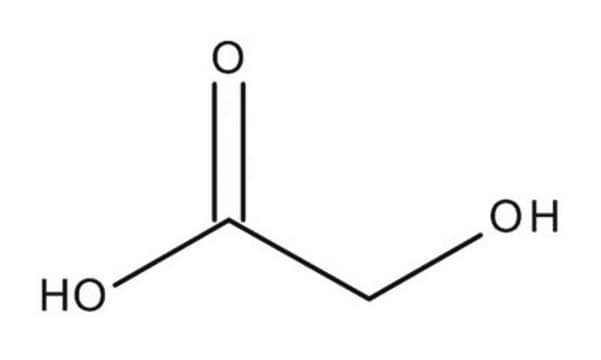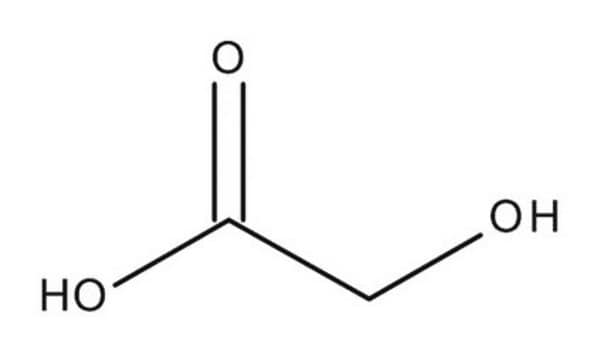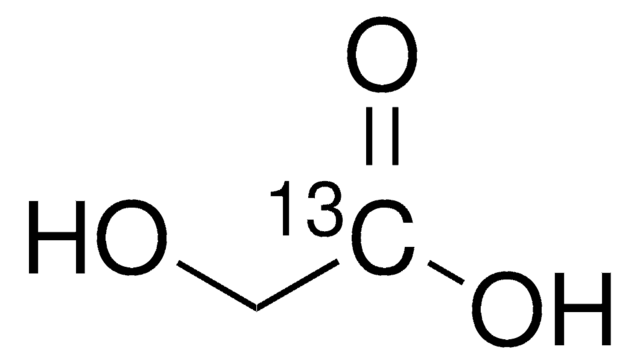420603
Glycolic acid solution
technical grade, 70 wt. % in H2O
Synonym(s):
Hydroxyacetic acid
Sign Into View Organizational & Contract Pricing
All Photos(1)
About This Item
Linear Formula:
HOCH2COOH
CAS Number:
Molecular Weight:
76.05
Beilstein:
1209322
MDL number:
UNSPSC Code:
12352100
eCl@ss:
39021303
PubChem Substance ID:
NACRES:
NA.22
concentration:
70 wt. % in H2O
grade:
technical grade
Recommended Products
grade
technical grade
Quality Level
form
liquid
concentration
70 wt. % in H2O
refractive index
n20/D 1.412
bp
112 °C
mp
10 °C
density
1.25 g/mL at 25 °C
functional group
carboxylic acid
hydroxyl
SMILES string
OCC(O)=O
InChI
1S/C2H4O3/c3-1-2(4)5/h3H,1H2,(H,4,5)
InChI key
AEMRFAOFKBGASW-UHFFFAOYSA-N
Looking for similar products? Visit Product Comparison Guide
Application
Glycolic acid solution may be employed to evaluate the efficacy of glycolic peels treatment for all types of acne.
Legal Information
Chemours product
Signal Word
Danger
Hazard Statements
Precautionary Statements
Hazard Classifications
Skin Corr. 1B
Storage Class Code
8A - Combustible corrosive hazardous materials
WGK
WGK 1
Flash Point(F)
Not applicable
Flash Point(C)
Not applicable
Choose from one of the most recent versions:
Already Own This Product?
Find documentation for the products that you have recently purchased in the Document Library.
Customers Also Viewed
Oxidation and reduction of glycolic and glyoxylic acids in plants. I. Glycolic and oxidase.
I ZELITCH et al.
The Journal of biological chemistry, 201(2), 707-718 (1953-04-01)
F F Becker et al.
Dermatologic surgery : official publication for American Society for Dermatologic Surgery [et al.], 22(5), 463-465 (1996-05-01)
Seventy percent glycolic acid solutions are being commonly used as superficial chemical peeling agents. The pH of these solutions ranges from 0.08 to 2.75. The histologic effects of these various pH solutions on human skin have not been studied. The
N Wang et al.
Journal of biomaterials science. Polymer edition, 8(12), 905-917 (1997-01-01)
A series of oligomers or low molecular weight polymers of lactic and/or glycolic acid has been synthesized with different molar ratios of lactic to glycolic acid. These oligomers have been characterized with respect to oligomer composition, molecular weight, intrinsic viscosity
L Atzori et al.
Journal of the European Academy of Dermatology and Venereology : JEADV, 12(2), 119-122 (1999-05-27)
Glycolic acid chemical peels have been widely accepted as a useful modality in many cutaneous conditions characterized by abnormalities of keratinization. The aim of this study is to evaluate the use of glycolic peels in the main clinical forms of
Thea R Pick et al.
Proceedings of the National Academy of Sciences of the United States of America, 110(8), 3185-3190 (2013-02-06)
Photorespiratory carbon flux reaches up to a third of photosynthetic flux, thus contributes massively to the global carbon cycle. The pathway recycles glycolate-2-phosphate, the most abundant byproduct of RubisCO reactions. This oxygenation reaction of RubisCO and subsequent photorespiration significantly limit
Our team of scientists has experience in all areas of research including Life Science, Material Science, Chemical Synthesis, Chromatography, Analytical and many others.
Contact Technical Service
